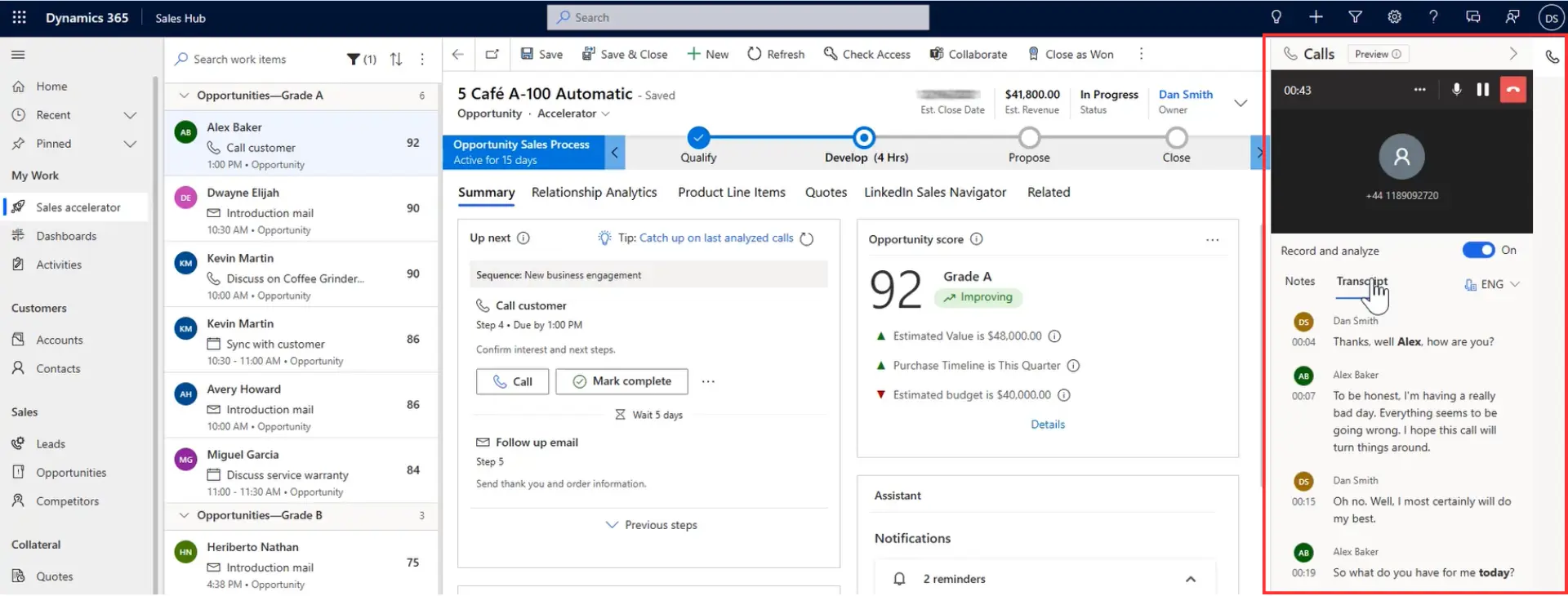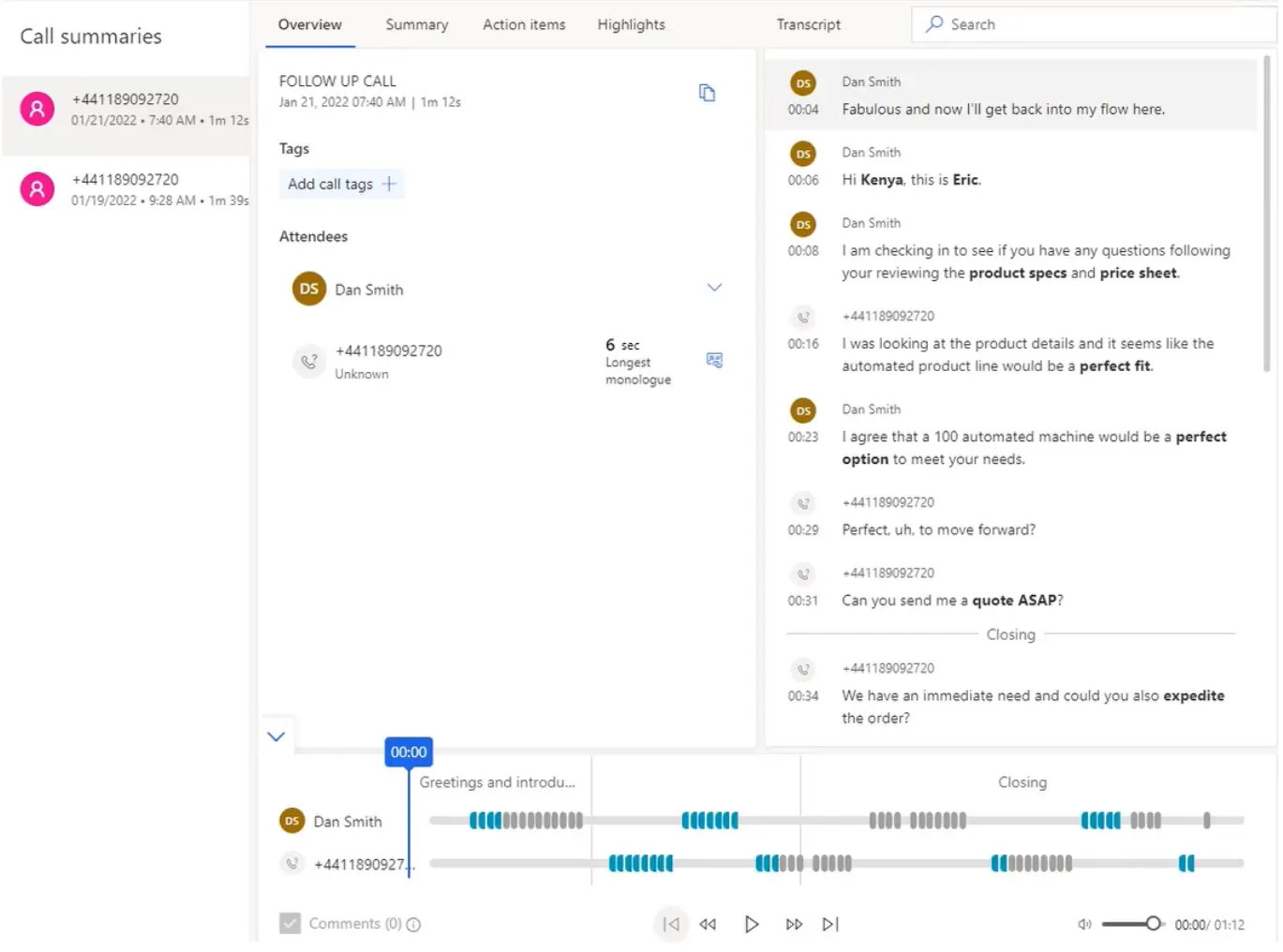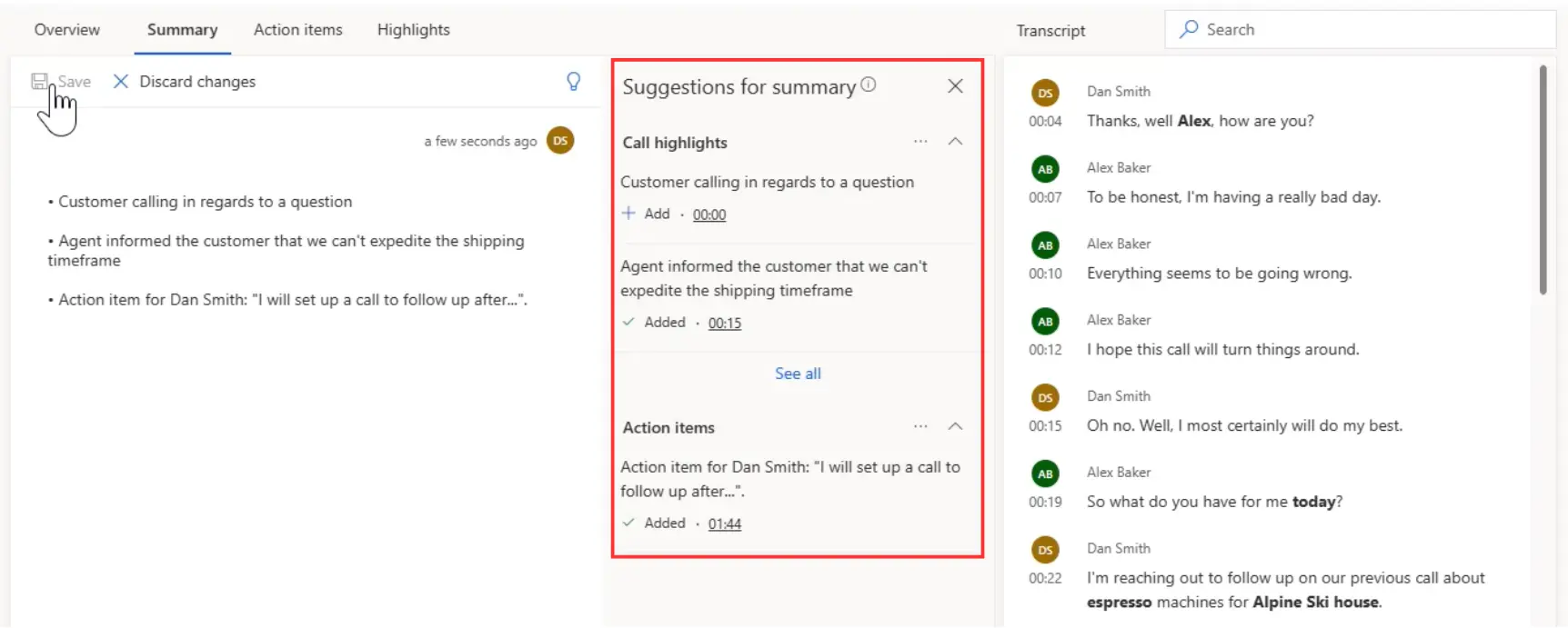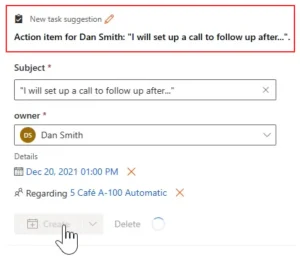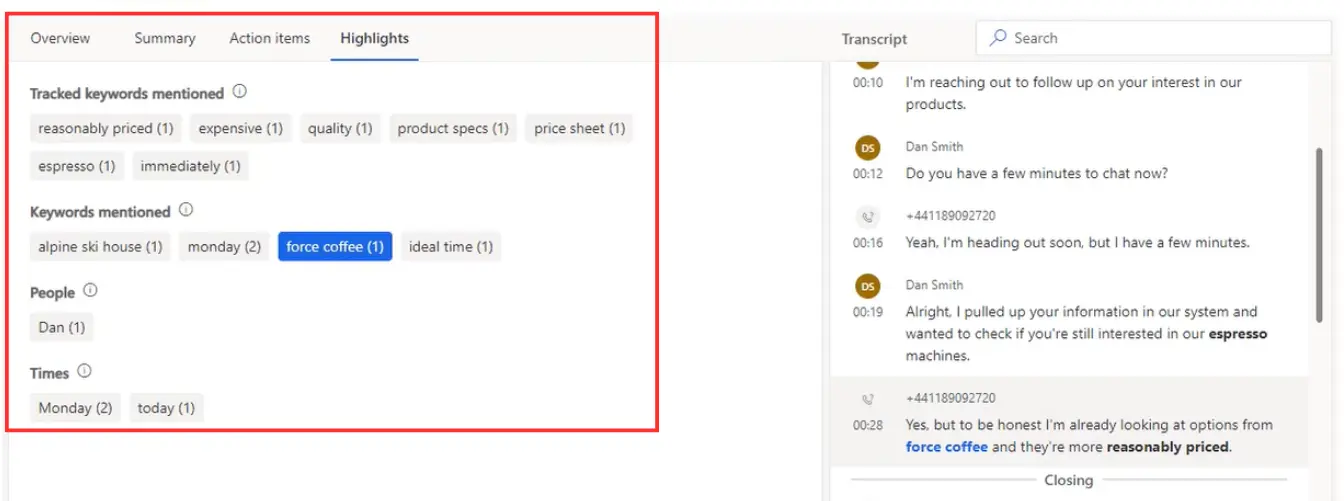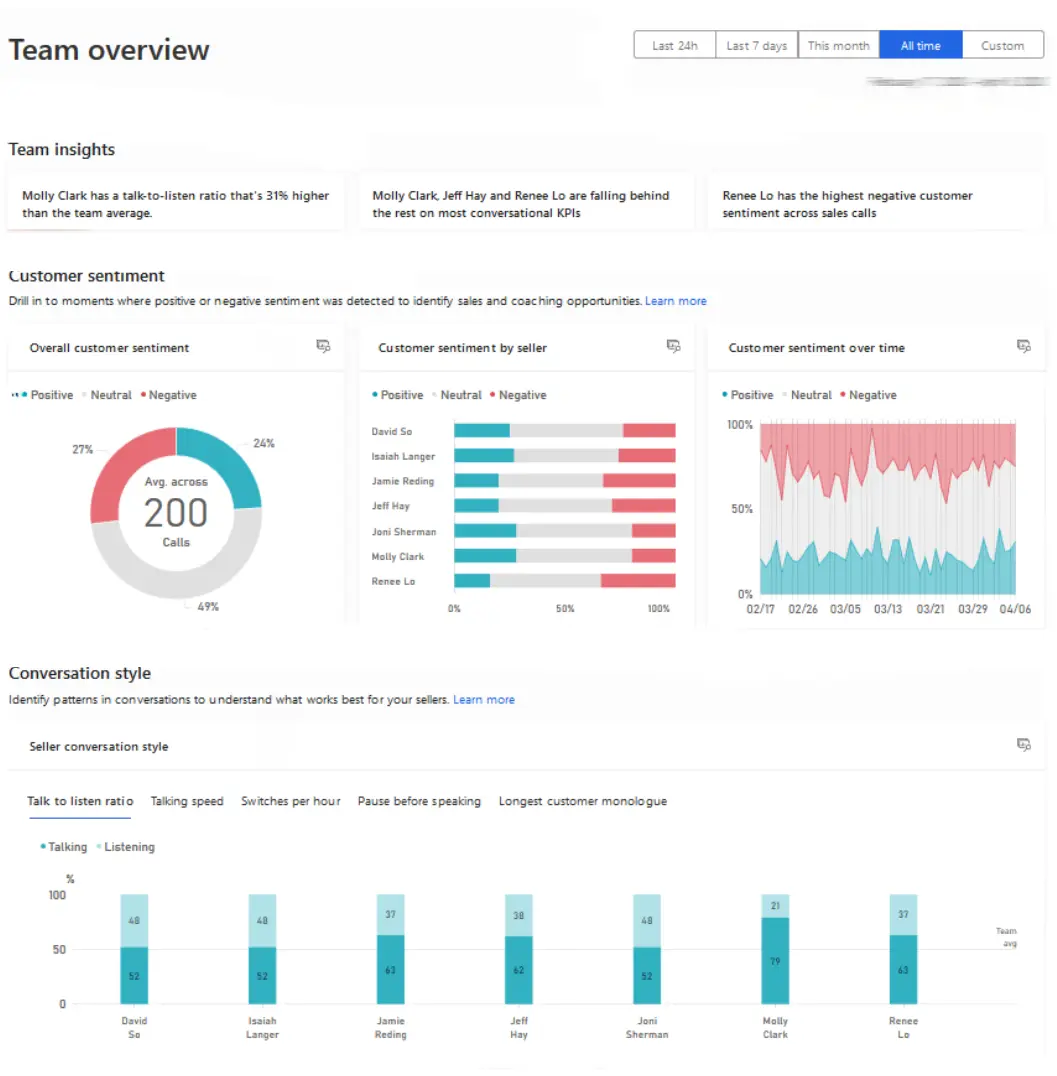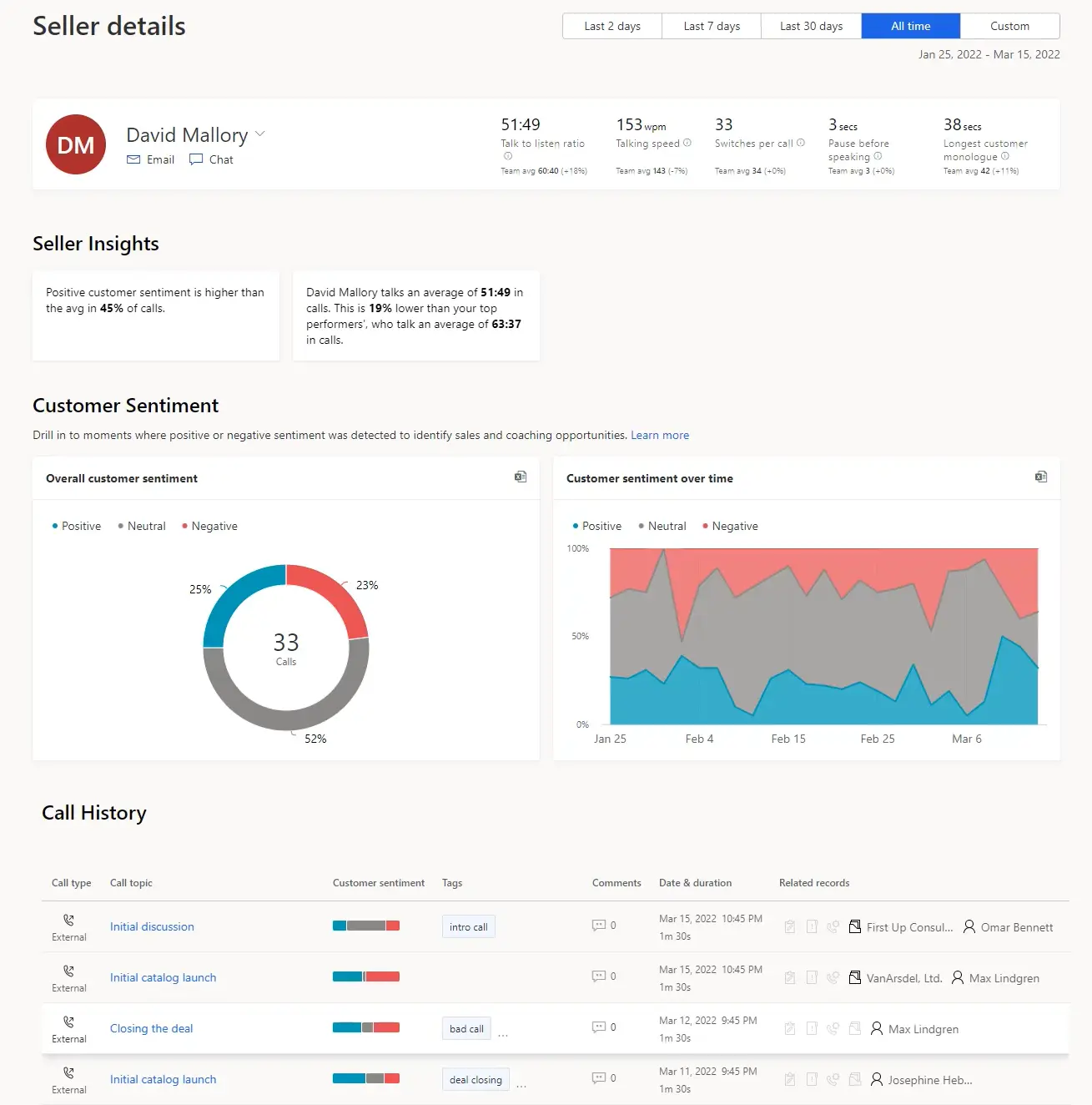Conversation Intelligence transcribes calls and analyses sentiment and behavioural styles to provide insights in Dynamics 365 Sales.
This article examines how the Conversation Intelligence feature benefit sellers and sales managers.
Increased Efficiency in Sales Processes
By automatically transcribing and analysing sales calls, Conversation Intelligence reduces administrative tasks, so sales teams can prioritise time engaging with customers, increasing the potential for successful outcomes.
Sales Coaching
Using Conversation Intelligence, leaders can access real-time data and metrics from their team’s customer interactions. These insights support personalised coaching sessions that focus on individual strengths and areas for performance improvement.
Data-Driven Decision Making
You can use aggregated data and call insights from sales interactions to make informed decisions. Whether it’s adjusting sales scripts, identifying trends, or adapting strategies, decisions will be grounded in your data.
How Conversation Intelligence Boosts Performance
Real-time transcription and analysis helps individual sellers review customer needs, quickly follow up on actions and adjust communication strategies appropriately.
Instant Call Transcripts
When you make a call in Dynamics 365 Sales, Conversation Intelligence automatically records and transcribes the call history.
Call Summaries
After each call, the Call Summary page comes into play, providing a structured overview to improve your post-call process.
Suggested Notes
You can review an auto-generated summary of discussion points in the Call Summary. These suggestions can serve as a basis for meeting notes or follow-up actions, so sellers can focus on strategic tasks rather than manually typing notes.
Select the relevant auto-generated call highlights to add these to an editable summary.
Action Items
Follow-up points from the call transcript will be highlighted, such as “I’ll phone next week”. From the Call Summary, these recommended tasks can quickly added as Dynamics activities and set regarding the appropriate record.
Mentions
After each call, you can view filters and categorisations of keywords, products and people referenced. Also, quickly find customer questions and competitor references from the transcript using automatic tagging. To increase the effectiveness of the Call Summary, track specific keywords and phrases relevant to your organisation.
Sentiment Analysis
The Call Summary sentiment analysis feature assesses the tone and mood of the conversation, providing insights into customer reactions and their mood throughout the call.
Call Playback
Playback lets you hear parts of the recorded conversation to recap particular points within the Call Summary. For example, jump to detected sentiments in the conversation or when certain keywords are mentioned.
Comments
You can annotate the call transcript, to highlight how specific points could be addressed differently during future calls. Each comment appears in the playback timeline, allowing quick navigation between recordings and the accompanying comment.
Practical Follow-Up Actions Using the Call Summary
With call summaries, you can always revisit sales conversations to stay on top of your customer interactions.
- Action Item Planning: Sellers use mentions, sentiment analysis, and suggested notes to create action items that address points from the call.
- Meeting Scheduling: Insights from call summaries help can help you set priorities and schedule follow-up meetings to meet expectations and align with sales strategies
- Personalised Communications: Understanding customer preferences and concerns from calls helps personalise interactions to move the sales process forward.
- Team Collaboration: Shared comments and notes encourage teamwork between participants. Call insights can also help guide the distribution of tasks based on team strengths and account roles.
Let’s look at how Conversation Intelligence arms sales leaders with insights to manage teams and proactively coach sellers.
Actionable Insights for Sales Leaders
When a sales manager logs into Conversation Intelligence, they’re presented with a comprehensive area that combines data points and call analytics into actionable insights.
What customers are talking about
- Sentiment Gauge: See the proportion of calls with more negative sentiments than average for deeper analysis into customer pain points.
- Keyword and Competitor Analysis: Highlights frequently mentioned keywords and competitors during calls to tailor approaches and identify opportunities.
What characterises top sellers?
- Behavioural Insights: Understand and replicate successful conversational habits of your best-performing team members. For instance, review KPIs such as talk-to-listen ratios and assess frequently used keywords.
- Performance Enhancement: Evaluate what makes your top sellers effective to effectively translate these conversational behaviours into coaching for your wider sales team.
Further conversation insights for sales managers
- Tracked keywords: Gain insights into trending keywords mentioned in calls.
- Trending competitors: Understand frequently mentioned competitors during sales conversations and use these insights for strategic planning and competitive analysis.
- Brands and organisations: Detect examples of new products, brands, and organisations frequently being spoken about, which can be influential in adapting your sales messaging.
How Sales Leaders Benefit from Conversation Intelligence
By seamlessly navigating between these insights, Conversation Intelligence helps sales leaders:
- Strategically Coach by moving from broad performance trends to nuanced coaching opportunities for individual sellers.
- Enhance Team Performance through targeted coaching sessions based on specific insights from customer sentiment analysis, conversation metrics and performance benchmarks.
- Optimise Sales Strategies by understanding market trends, evolving customer needs and competitive dynamics reflected in team and individual seller conversations.
How to enable Conversation Intelligence
- Log into your Dynamics 365 with administrator privileges.
- Go to the ‘Sales Insights Settings’ area.
- In Global settings, locate the ‘Conversation Intelligence’ option within Sales Insights.
- Enable it by toggling the feature on.
- Customise settings to tailor the conversation tracking to your business needs, including a recording policy and keywords to track.
Contact ServerSys for help activating this feature in your environment with tailored settings. You can also visit Microsoft Learn to follow the detailed setup instructions.
Licensing Dynamics 365 Conversation Intelligence
The Conversation Intelligence feature requires Dynamics 365 Sales Enterprise or Premium licences.
Phone system requirements
- Using Microsoft Teams: An installation of a Teams phone system and a valid license to use it with the Teams dialler enabled and configured.
- Using a third-party dialler: Integrating a licensed third-party dialler with D365 Sales.
Setting recording policies
Conversation Intelligence recording policies define the security roles and recording options. These allow you to create multiple recording policies and assign them to different security roles. The available options are:
- Manually record all participants
- Manually record all participants; sellers are automatically recorded
- Automatically record all participants.
- Automatically record all participants; sellers can stop recording.
Conversation Intelligence data retention
The default Microsoft-provided storage offers call retention periods of 30 days or 90 days. If you want to store call recordings and transcripts longer, update the settings to use your organisation’s Azure storage.
Redacting personal data
By default, Conversation Intelligence doesn’t redact personal data in transcripts, such as account numbers and credit card details.
However, Microsoft has introduced functionality to comply with payment card industry (PCI) regulations by enabling an option to hide personal data that will mask card details before saving a transcript.
Take the Next Step
Contact ServerSys today. Let’s explore how Conversation Intelligence for Dynamics 365 could help you team improve sales performance.

